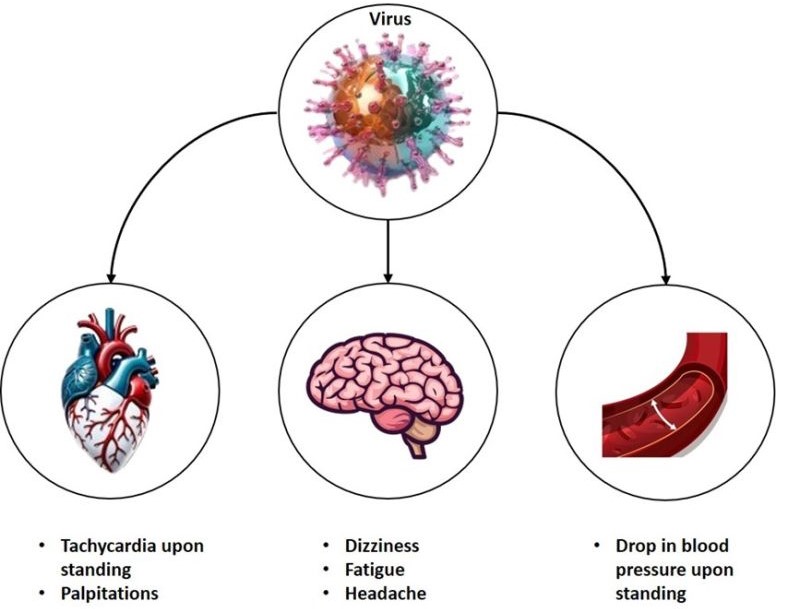Abstract
The prevalence of autonomic dysfunction, including postural orthostatic tachycardia syndrome (POTS), in patients with long COVID is significant. Studies have shown that a high proportion of long COVID patients develop POTS, with symptoms such as tachycardia, orthostatic intolerance, fatigue, and cognitive impairment. Autonomic testing in long COVID patients revealed that a considerable number exhibited autonomic dysfunction, with some showing abnormal results affecting parasympathetic cardiac function. Additionally, the majority of long COVID patients did not display specific evidence of POTS or other clear autonomic dysfunction, with only a small percentage meeting the criteria for POTS diagnosis. These findings highlight the importance of evaluating autonomic symptoms and dysfunction, including POTS, in patients with long COVID to guide appropriate management strategies for improved health outcomes.
Keywords:
postural orthostatic tachycardia syndrome, autonomic dysfunction, long covid, cardiovascular implications, immune response, healthcare adaptation, diagnostic challengesReferences
El-Rhermoul F-Z, Fedorowski A, Eardley P, Taraborrelli P, Panagopoulos D, Sutton R, et al. Autoimmunity in Long Covid and POTS. Oxford Open Immunology. 2023;4(1).
Kim DH, Park JY, Kim SY, Lee NM, Yi DY, Yun SW, et al. Awareness of postural orthostatic tachycardia syndrome is required in adolescent syncope. Medicine. 2022;101(45).
Seeley M-C, Gallagher C, Ong E, Langdon A, Chieng J, Bailey D, et al. High Incidence of Autonomic Dysfunction and Postural Orthostatic Tachycardia Syndrome in Patients with Long COVID: Implications for Management and Health Care Planning. The American Journal of Medicine. 2023.
Allendes FJ, Díaz HS, Ortiz FC, Marcus NJ, Quintanilla R, Inestrosa NC, et al. Cardiovascular and autonomic dysfunction in long-COVID syndrome and the potential role of non-invasive therapeutic strategies on cardiovascular outcomes. Frontiers in Medicine. 2023;9: 1095249.
Gómez-Moyano E, Rodríguez-Capitán J, Gaitán Román D, Reyes Bueno JA, Villalobos Sánchez A, Espíldora Hernández F, et al. Postural orthostatic tachycardia syndrome and other related dysautonomic disorders after SARS-CoV-2 infection and after COVID-19 messenger RNA vaccination. Frontiers in Neurology. 2023;14:1221518.
Hupin D, Pichot V, Back M, Nygren Bonnier M, Reistam U, Runold M, et al. Diagnostic value of 24-h ECG recording in Long COVID patients with postural orthostatic tachycardia syndrome. Europace. 2023;25(Supplement_1).
Bryarly M, Cabrera J, barshikar s, Vernino S. Minimal Objective Autonomic Dysfunction in Long-COVID (S43.004). Neurology. 2023;100(17_supplement_2).
Zanin A, Amah G, Chakroun S, Testard P, Faucher A, Le TYV, et al. Parasympathetic autonomic dysfunction is more often evidenced than sympathetic autonomic dysfunction in fluctuating and polymorphic symptoms of "long-COVID" patients. Scientific Reports. 2023;13(1).
Fleischer J, Gunaratnam SVG, Huang Y, Ang L, Charles M, Katona A, et al. 487-P: Cardiovascular Autonomic Function in Long COVID-19 Individuals With and Without Diabetes. Diabetes. 2023;72(Supplement_1).
Isaac R, Corrado J, Sivan M. Detecting Orthostatic Intolerance in Long COVID in a Clinic Setting. International Journal of Environmental Research and Public Health. 2023;20(10).
Minhas R, Bharadwaj AS. COVID-19-Induced Postural Orthostatic Tachycardia Syndrome and Dysautonomia. Cureus. 2023 Jun;15(6).
Hira R, Siddiqui T, Baker J, Bourne K, Ranada S, Soroush A, et al. Objective cardiovascular autonomic abnormalities persist over time in patients with Post-Acute Sequelae of COVID-19 (PASC). Physiology. 2023;38(S1).
How to Cite
License
Copyright (c) 2024 Dipanshu Aggarwal, Mahendra Pratap Singh, Anoop Velayudhan, Safayet Jamil, Carlos Quispe-Vicuña, Afukonyo Shidoiku Daniel, Joseph Clement Chipeta, Gopi Kumbha, Pooja Sindwani

This work is licensed under a Creative Commons Attribution-NonCommercial 4.0 International License.
Copyright© by the author(s). Published by the Evidence Journals. This is an open access article distributed under the terms of the Creative Commons Attribution (CC BY) license (https://creativecommons.org/licenses/by/4.0/), which permits unrestricted use, distribution, and reproduction in any medium, provided the original author(s) and source are credited.
Most read articles by the same author(s)
- Ayush Sharma, Frederick Satiro Vaz, Urvi Swami, Sowntappan Balasubramanian, Gopi Kumbha, Nimisha Bhuyan, Nabhira aftabi binte Islam, Pawan Kumar, Rabies control in Asia through one health interventions: a scoping review , The Evidence: Vol. 2 No. 1 (2024): JAN - MAR
- Emdadul Hasan Mukul, Safayet Jamil, Harshini Suresh, Mahdi Hasan, Habib Mohammad Ali, ABM Alauddin Chowdhury, Quazi Istiaque Bari, Asma Akhter, Tawhed Islam, Rakibur Rahman, Nazmul Islam, Ashikur Rahman Rony, Knowledge, attitude, and practice of mothers on prevention and control of intestinal parasitic infection in rural areas of Bangladesh: a cross-sectional study , The Evidence: Vol. 2 No. 1 (2024): JAN - MAR
- Neha Bajwa, Vighnesh Devulapalli, Mahendra Pratap Singh, Kumbha Gopi, Sanobar Shariff, Pavan Kumar, Carlos Quispe-Vicuña, Microneedle technology: a gateway to transformative healthcare solutions , The Evidence: Vol. 2 No. 3 (2024): JUL - SEP




